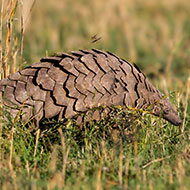Pangolins found to carry coronavirus-related strains

Pangolins are the most trafficked mammal in Asia and, increasingly, Africa.
Scientists have found viruses closely related to the COVID-19 coronavirus in pangolins.
Researchers identified two groups of coronaviruses that exhibit 'strong similarity' to the virus in Malayan pangolins. The pangolins were seized during anti-smuggling operations in southern China.
Scientists say the discovery suggests that pangolins should be considered possible hosts for the emergence of the virus and should, therefore, be removed from “wet” markets to prevent zoonotic transmission. Their finding is published in the journal Nature.
Lead author Dr Tommy Lam, from the University of Hong Kong, told BBC News: "Although their role as the intermediate host of the SARS-CoV-2 outbreak remains to be confirmed, sale of these wild animals in wet markets should be strictly prohibited to avoid future zoonotic [animal to human] transmission.”
It is widely believed that the strain of coronavirus currently sweeping the world originated at a “wet” market in Wuhan, China. Wet markets sell live and dead fish, meat and wild animals, including bats and pangolins.
Scientists presume that bats are the likely reservoir hosts for the SARS-CoV-2 virus. However, the identity of the intermediate host that passed the virus from a bat to a human is not yet known.
Dr Lam says that that finding the virus in the smuggled Malayan pangolins raised the question about where they contracted the virus. 'Was it from bats along the trafficking route to China or in their native habitats in Southeast Asia', he said.
According to the World Wildlife Foundation, pangolins are the most trafficked mammal in Asia and, increasingly, Africa. They are in high demand in countries like China and Vietnam where their meat is considered a delicacy and their scales are used in traditional medicine.
All eight species of pangolin are protected under national and international law. However, there is a growing international illegal trade in the mammal. Based on reported seizures between 2011 and 2013, an estimated 116,990 to 233,980 were killed, which experts say represents as little at 10 per cent of the actual number of pangolins being illegally traded.
Conservationists told the BBC that it would be 'devastating' should the latest discovery lead to the further mistreatment of pangolins.
Elisa Panjang of Cardiff University, a pangolin conservation officer at the Danau Girang Field Centre in Malaysia, said: "This is the time for the international community to pressure their governments to end illegal wildlife trade.”
In response to the recent outbreak, China has banned the consumption of meat from wildlife, and similar measures are being considered in Vietnam.



 The veterinary mental health charity Vetlife is inviting the veterinary community to join it for a sponsored cold-water dip.
The veterinary mental health charity Vetlife is inviting the veterinary community to join it for a sponsored cold-water dip.